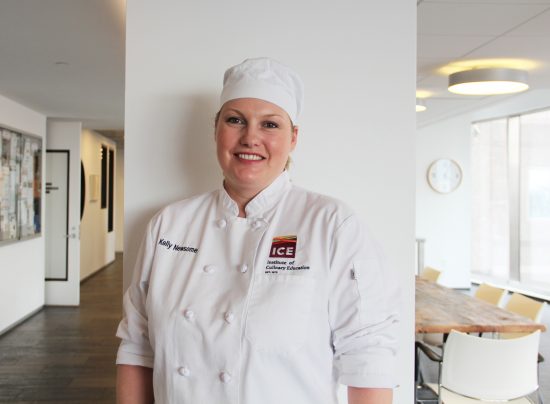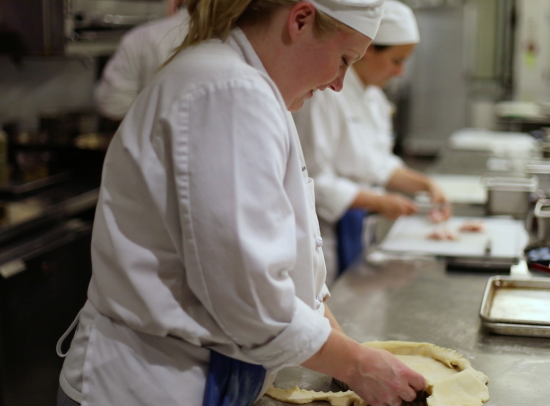When you're a lunatic like me, food gets you so excited that you want to do everything. After a lesson on India's curries, I was ready to pack my bags for a sabbatical to diligently tend tandoori ovens and learn from the master chapati makers of the Indian sub-continent. After two weeks learning about the regional cooking of Italy, I was fantasizing about working in the kitchen of an idyllic agriturismo in the Tuscan countryside — perhaps learning the fine art of truffle hunting was in my future? Then there’s my love of writing, cookbooks and teaching — how could that fit into my plans?
As tantalizing as these possibilities seem, the reality is equally foreboding — I need to choose one thing, right now, and this decision could determine the direction of my culinary career, forever. It feels like taking the SATs all over again.
Adding to this predicament has been my recent experience in Module 4, Pastry & Baking Arts. I’d like to blame it on the butter but the truth is: I love the precision that baking demands. Accuracy, care and diligence almost always result in an excellent final product — and I like that. With all these interesting paths to explore, how should I go about deciding which one to follow?
Like many of my classmates who are nearing the end of their class instruction, the challenges we face are practical: we need to make a living; we need to fend off doubters and naysayers; we’re looking for personal fulfillment in our careers; and health insurance would be nice. With these concerns in mind, I’ve decided to lay out a roadmap of my planned approach.
I can’t say it’s the right way, but hopefully it will set me on a path toward career fulfillment — and who knows, maybe it will help others who are facing a similar dilemma.

Talk To Your Chef-Instructors
This may seem like the most obvious, but it is absolutely the most important. Our instructors have extensive experience performing at the highest level of the culinary industry — a level achieved by people who work hard and make smart choices. Realizing that I needed some serious guidance, I asked my current instructor, Chef Chad Pagano for his advice to culinary students feeling “overly enthusiastic” and a little unsure about their direction.
Here’s what Chef Chad had to say: “First and foremost, stop overthinking it. Listen to your heart. Passion and love of the food industry will steer you in the right direction. Within that, work for the best chef you can find. I don’t care if it’s in the basement of his house. Young cooks need two things: practical kitchen skills and work ethic. You should also be reading, watching videos and immersing yourself in the industry. This would include volunteering and attending any and all demos and events at the school. This will help you fall into the proper direction for your career.”
With this advice in mind, I’ve been able to narrow my search for an externship because I know I want to start my career working for the best possible chef that will have me. I was also able to narrow my search because there were certain types of restaurants that intuitively felt right to me and others that didn’t. So follow your heart. It may sound cliché, but the truth is, it will never let you down.
Explore All Your Possibilities
I have a vast pool of culinary interests, from working in a fine-dining restaurant to becoming a food editor or cookbook author. The great thing about ICE is that we have the opportunity to explore all of these options through externships and extracurricular courses. I’ve decided to apply for both food media and restaurant externships. I will go on trails at restaurants and interviews in test kitchens. My hope is that, just like a date, the experience will tell me the right choice to make.

Get Involved
Volunteering at different culinary events throughout the city has not only given me a flavor of what to expect in professional restaurant kitchens, but it has also exposed me to some of the biggest culinary leaders in the industry. You get a sense of how to behave, what is expected of you and the pace and environment you might be walking into. Not to mention, it’s a chance to make a good impression, learn, observe and explore some of the possibilities.
Don’t Stress
One thing that I know for sure, because it has been hammered into my head for four straight modules, is that if you work hard, have a good attitude and the desire to perform at your absolute best, you’re going to be okay. So don’t stress, just smile (when possible), put your head down and do the best work that you can at all times.
The most important lesson that I have learned since beginning culinary school at ICE is that you need to stay true to you. Don’t forget what brought you to culinary school in the first place. There will always be people telling you that you didn’t need to go to culinary school, people who say you won’t make any money, people who tell you that you’re crazy for wanting to cook for a living. It doesn’t matter what they think, because if you felt this was right for you, then you are doing the right thing.
Some people even say that the term “passion” is overused and has lost its meaning. I say that if passion for food and the culinary arts is what inspired you, keep being passionate and you’ll find the right direction for you.
Ready to embark on your culinary career path? Learn more about ICE's career programs.




